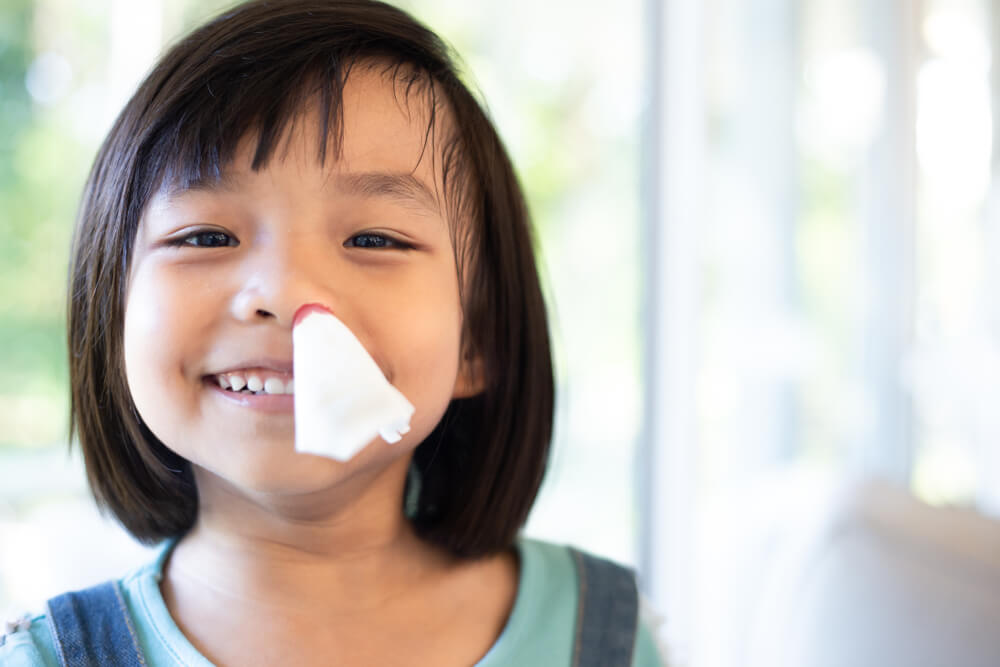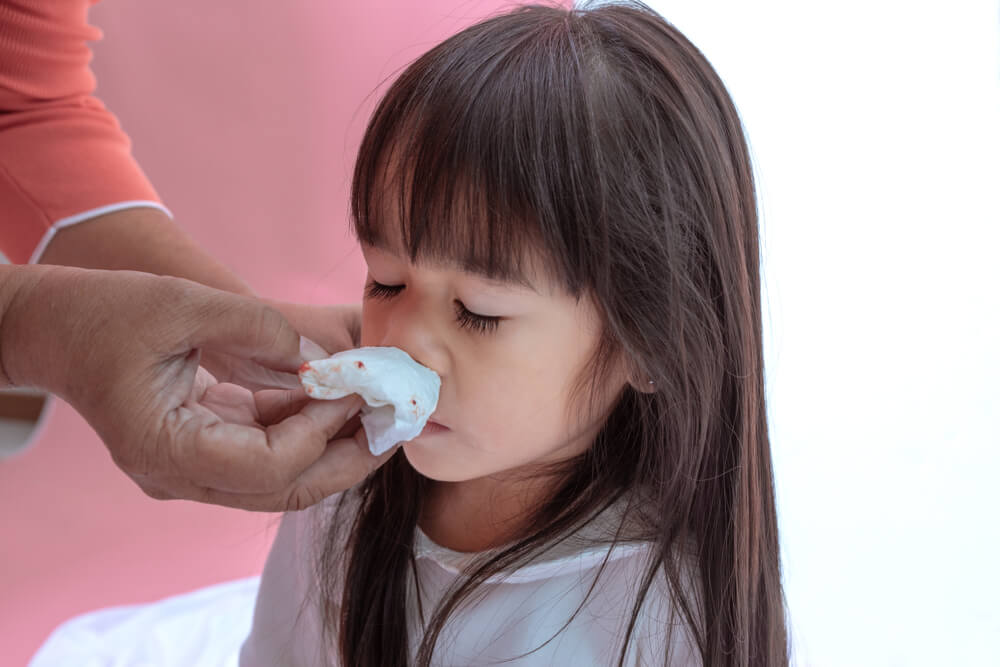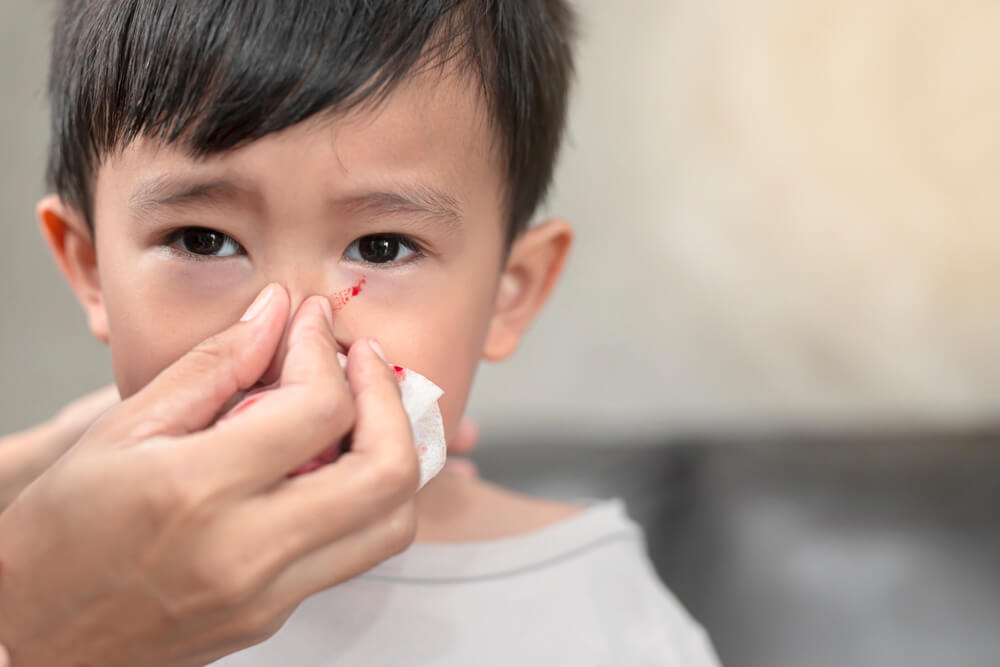Nosebleeds in kids, while often a common occurrence, can be alarming for parents. Understanding the reasons behind these episodes is crucial for both reassurance and proactive management.
In this comprehensive guide, the expert team at Children’s Medical Center of South Florida will explore the various causes of nosebleeds in kids, shed light on the term “epistaxis,” and discuss when it’s essential to seek guidance on a child’s nosebleed.
Unraveling the Mystery of Nosebleeds in Kids

Nosebleeds, scientifically referred to as epistaxis, can stem from various factors, and understanding the root causes is the first step in managing and preventing recurrent episodes.
Dry Air
Dry air, a common culprit, can lead to the drying and cracking of the delicate blood vessels in the nasal passages. This is particularly prevalent in dry climates or during the winter months when indoor heating systems reduce humidity. Ensuring proper humidification in your home can go a long way in preventing nosebleeds associated with dry air.
Nose Picking
Children, especially younger ones, may engage in nose-picking, unknowingly causing trauma to the nasal passages. The mucous membranes inside the nose are delicate, and any disruption can lead to bleeding. Gentle reminders and teaching alternative habits, such as using a tissue, can help mitigate this cause.
Allergies
Allergies, whether environmental or food-related, can contribute to nasal inflammation and irritation. The constant rubbing or blowing of the nose during allergy flare-ups can increase the likelihood of nosebleeds. Identifying and managing allergies through consultation with a healthcare professional can address this underlying cause.
Respiratory Infections
Common colds and respiratory infections can result in increased nasal congestion and the production of excess mucus. The combination of congestion and frequent nose blowing can make the blood vessels more susceptible to bleeding. Adequate rest and hydration during illnesses can support the healing process.
Trauma or Injury
Accidental trauma or injury to the nose is a more obvious cause of nosebleeds. This can result from a fall, sports-related activities, or any impact on the face. While these incidents may cause immediate bleeding, it’s essential to monitor for any signs of persistent or recurrent nosebleeds following an injury.
Foreign Objects
Children, in their exploratory nature, may insert small objects into their noses, leading to irritation and potential bleeding. If a foreign object is suspected, it’s crucial to seek prompt medical attention to avoid complications and address the underlying issue.
Underlying Medical Conditions
In some cases, nosebleeds can be a symptom of underlying medical conditions, such as bleeding disorders or structural abnormalities in the nasal passages. If nosebleeds are recurrent, unexplained, or accompanied by other concerning symptoms, it’s advisable to consult with a healthcare professional for a thorough evaluation.
When to Worry About a Child’s Nose Bleed
While nosebleeds in kids are often benign and resolve with simple interventions, there are instances where parents should be vigilant and seek medical guidance:
Frequent or Recurrent Episodes
If a child experiences frequent or recurrent nosebleeds, it may indicate an underlying issue that requires investigation. Consult with a healthcare professional to determine the cause and appropriate management.
Prolonged Bleeding
If a nosebleed persists for more than 20 minutes, despite applying gentle pressure and other home remedies, seek immediate medical attention. Prolonged bleeding may indicate a more significant issue that needs prompt evaluation.
Associated Symptoms
If nosebleeds are accompanied by other concerning symptoms such as persistent fatigue, pallor, bruising, or unexplained weight loss, it’s crucial to consult with a healthcare professional for a comprehensive assessment.
Difficulty Breathing
If a child experiences difficulty breathing during or after a nosebleed, seek immediate medical attention. This may indicate a nasal obstruction or other respiratory concern that requires prompt intervention.
Managing and Preventing Nosebleeds in Kids
Nosebleeds in kids can be unsettling, but by incorporating proactive measures into daily life, parents can significantly reduce the occurrence and severity of these episodes. Here’s a closer look at effective strategies for managing and preventing nosebleeds in children:
Humidify Indoor Air
Maintaining optimal humidity levels in your home is a key preventive measure to counteract the drying effects of indoor air, especially during dry seasons or in regions with low humidity. Using a humidifier in bedrooms or commonly frequented areas creates an environment that helps prevent the nasal passages from drying out and cracking. Ensure the humidifier is kept clean to avoid mold or bacteria buildup.
Teach Gentle Nose Care
Educating children about the significance of gentle nose care is paramount in preventing nosebleeds. Encourage the use of soft tissues for blowing the nose, emphasizing the importance of a gentle touch. Discourage forceful rubbing or picking, which can lead to irritation and potential bleeding. By consistently reinforcing these habits, parents empower children to take an active role in maintaining the health of their nasal passages.
Address Allergies
Allergies can significantly contribute to nasal irritation and nosebleeds. Collaborate with a healthcare professional to identify specific allergens triggering these episodes. Implementing strategies to avoid allergens, such as using allergen-proof bedding, installing air purifiers, or making adjustments to the home environment, can be effective. In cases where allergen exposure is unavoidable, consider using allergy medications as recommended by a healthcare provider to manage symptoms effectively.
Hydration
Proper hydration plays a crucial role in supporting the health of the nasal mucous membranes. Ensure that your child maintains adequate hydration by encouraging regular water intake throughout the day. Including water-rich foods in their diet, such as fruits and vegetables, can also contribute to overall hydration. A well-hydrated body helps maintain the moisture levels in the nasal passages, reducing the risk of dryness and subsequent nosebleeds.
Apply Saline Nasal Spray
Saline nasal sprays serve as a simple yet effective tool for keeping the nasal passages moist, decreasing the likelihood of nosebleeds. Consult with a healthcare professional before introducing any nasal products, especially in younger children, to ensure proper usage and dosage. Saline nasal sprays are particularly beneficial for children experiencing dry air or those prone to seasonal allergies. Regular use, as recommended, can be an integral part of a preventive nasal care routine.
Regular Health Checkups
Schedule regular health checkups for your child to monitor and address any underlying health conditions that may contribute to nosebleeds. A healthcare professional can assess overall nasal health, identify potential triggers, and provide personalized recommendations for preventive care.
Promote Healthy Lifestyle Habits
Encourage a healthy lifestyle that supports overall well-being, including nasal health. Balanced nutrition, regular exercise, and sufficient sleep contribute to a robust immune system and overall health, potentially reducing the frequency of nosebleeds.
Demonstrate Proper Nose Blowing Technique

Teach your child the correct technique for blowing their nose to minimize the risk of nasal trauma. Instruct them to blow gently, one nostril at a time, with their mouth open to avoid excessive pressure on the nasal passages.
Manage Pediatric Epistaxis With Expert Help
Nosebleeds in kids, while often benign, can be concerning for parents. By understanding the common causes, recognizing when to seek medical attention, and implementing preventive measures, parents can navigate these episodes with confidence. It’s essential to maintain open communication with healthcare professionals, especially when nosebleeds are recurrent or accompanied by worrisome symptoms. Through a combination of a vigilant eye, proactive management, and a focus on preventive habits, parents can ensure their child’s nasal health and well-being.
On the other hand, sometimes nosebleeds point to something more serious. In that case, rest assured that our emergency care services are here to ensure that the potential danger gets evaded.


